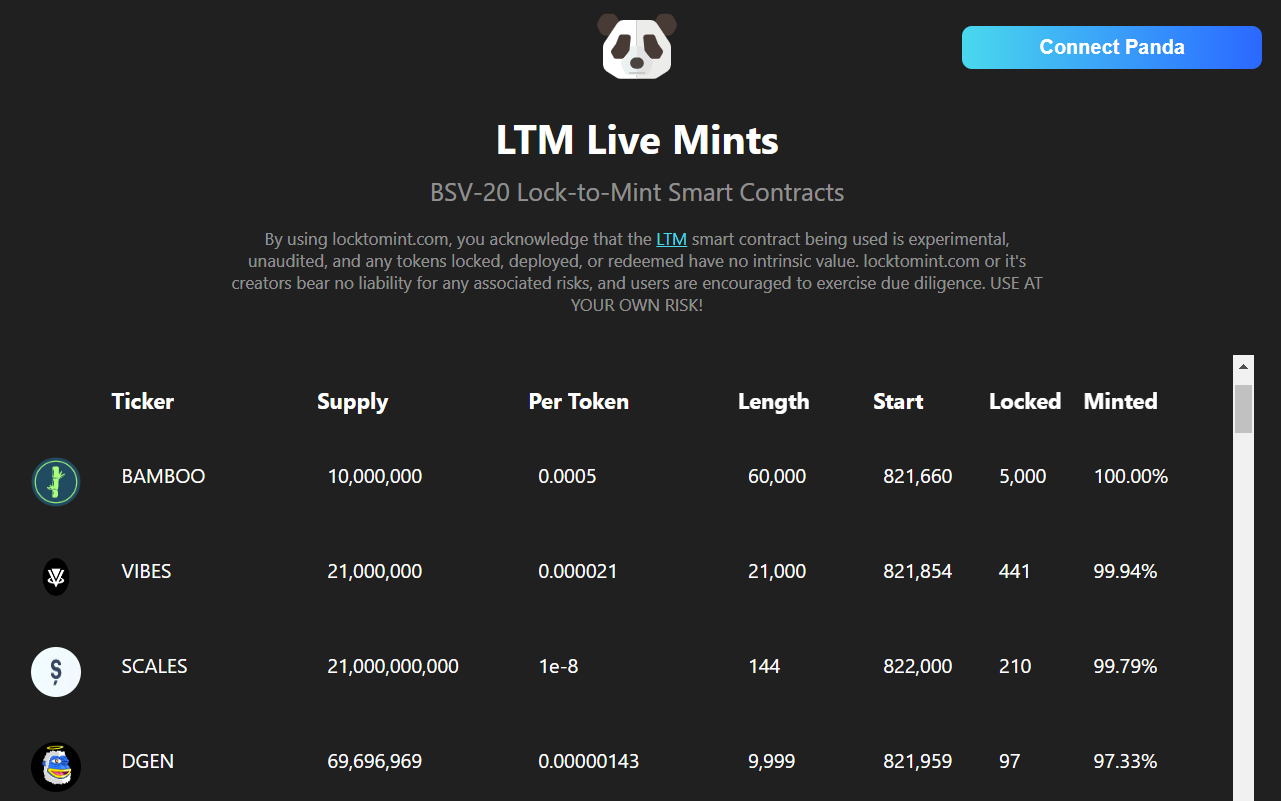|
Getting your Trinity Audio player ready...
|
Open-sourced Web3 browser extension Panda Wallet announced the launch of locktomint.com, where users can mint tokens against an on-chain smart contract enforced in Bitcoin script. The first token launched for this contract was appropriately named Bamboo, with a supply of 10,000,000 and requiring 0.0005 BSV to be locked for 60,000 blocks per token. Panda Wallet stated that Bamboo is the native token of the project. The entire contract required 5,000 BSV to be locked for over one year in order to mint out fully.
Block 821,660
The world's first onChain enforced smart contract for Lock-To-Mint (LTM).
Be there…https://t.co/cZOk2fgYF6
Contract:
1bff350b55a113f7da23eaba1dc40a7c5b486d3e1017cda79dbe6bd42e001c81_0 pic.twitter.com/oHcBMWLLxn— Yours Wallet (@yoursxbt) December 7, 2023
This approach was in contrast to LRC-20, which was inspired by BRC-20 on BTC, which has no on-chain scripting requirements. The contract was deployed at block 821,630, with the nice feature that the first mint could only take place from block 821,660, proving a fair mint. The contract implements BSV-20 v2, a ticker-less version of BSV-20 without the first-is-first rule.
Once block 861,660 was mined, users had to set up their Panda Wallet and connect to locktomint.com, where they could specify how many tokens to mint and confirm to lock. Unlike the BRC-20 model, where minting rules are rigid, here users can mint as many tokens within the supply limit as they like at once. For example, one user locked 264 BSV to mint 528,000 Bamboo in one transaction, just over 5% of the total supply. Furthermore, the smart contract has the benefit of not being able to over mint since its logic is enforced in the script. The contract developed via sCrypt was open-sourced once the mint concluded, just hours after the token launch.
Here is the LTM Smart Contract used for the #BAMBOO mint released under the MIT license. https://t.co/wua1kD6gwq
Additionally, deploying new contracts at https://t.co/cZOk2fgYF6 are now available for anyone wishing to deploy their own LTM Smart Contract. pic.twitter.com/aSYmSReKoX
— Yours Wallet (@yoursxbt) December 8, 2023
As a result, the total number of BSV locked across the entire blockchain doubled from around 5,000 to over 10,000, an all-time high from the Bamboo mint alone. More impressively, at least 50% of these coins are locked for over one year, removing and deflating the circulating supply.
Unlike hodl and LRC-20, BSV-20 v2 is supported in Panda Wallet and by the GorillaPool 1 Sat Indexer, so users can immediately notice their valid balance and transfer tokens. However, the indexer does not have the same complete support as the original implementation of BSV-20 v1, so marketplaces such as firesat.io could not list the token for trading at launch, though they have stated that they are working on both, prioritizing Bamboo.
The smart contract approach with lock to mint, like LRC-20, has trade-offs, such as minting being able to be executed only once at a time. Users were getting broadcast errors as they were trying to double-spend the latest transaction in the contract. The benefit is all rules are enforced on-chain, easing the burden on wallets and indexers as there is no “first is first” interpretation.
The Bamboo mint overtly demonstrates validation of the Lock to Mint concept that resonates with not only BSV incumbents but also other “crypto” users.
#Locking is currently the most talked about and controversial thing in #BitCoin. The entire crypto industry is now trapped in the singularity.
There is only one way this ends if it continues to gain traction. Go build a locking app.
— wags (@danwag06) December 10, 2023
The idea of receiving tokens in exchange for saving coins in the future is much more welcomed by the community as opposed to giving up coins in exchange for tokens or NFTs with the uncertainty of a return. In this paradigm, users are giving up their opportunity cost to spend within a time frame, not giving it up completely by spending.

After the success of Bamboo, locktomint.com opened up the deployment of smart contracts and minting of any token and now displays a global list. This boosted the overall coins locked on BSV to over 12,100 as of writing. Lock-To-Mint (LTM) as a concept is clearly here to stay.
Watch: Tokens on Bitcoin? One Sat Ordinals and sCrypt

 03-03-2026
03-03-2026 




